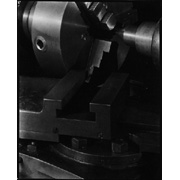| PAUL STRAND American, 1890-1976 |
||
|
Modernism in general has been defined by Meyer
Schapiro as an attitude that allowed art to become more "deeply personal, more
intimate, and concerned with experiences of a subtle kind [by] artists [who] are
willing to search further and to risk experiments or inventions which in the past
would have been inconceivable because of fixed ideas of the laws and boundaries
of the arts." In choosing such unexpected subjects as industrial artifacts, Strand
and Renger-Patzsch risked having their meaning misunderstood, for they were expressing
themselves as poets, not as reporters. Like the lyrical poet, the photographer
possesses an acute and exhilarating respect for the eminence and reality of the
object; the new object that has been created in the form of a photograph has no
other reason to exist than the pleasure it brings. Poet-photographers make up
their own language from picture to picture and keep us interested in spare and
unusual compositions by not photographing in the ways we expect. The poetic photograph
has the power-sometimes brutally direct-to create deep and unnameable feelings
about commonplace objects. |
